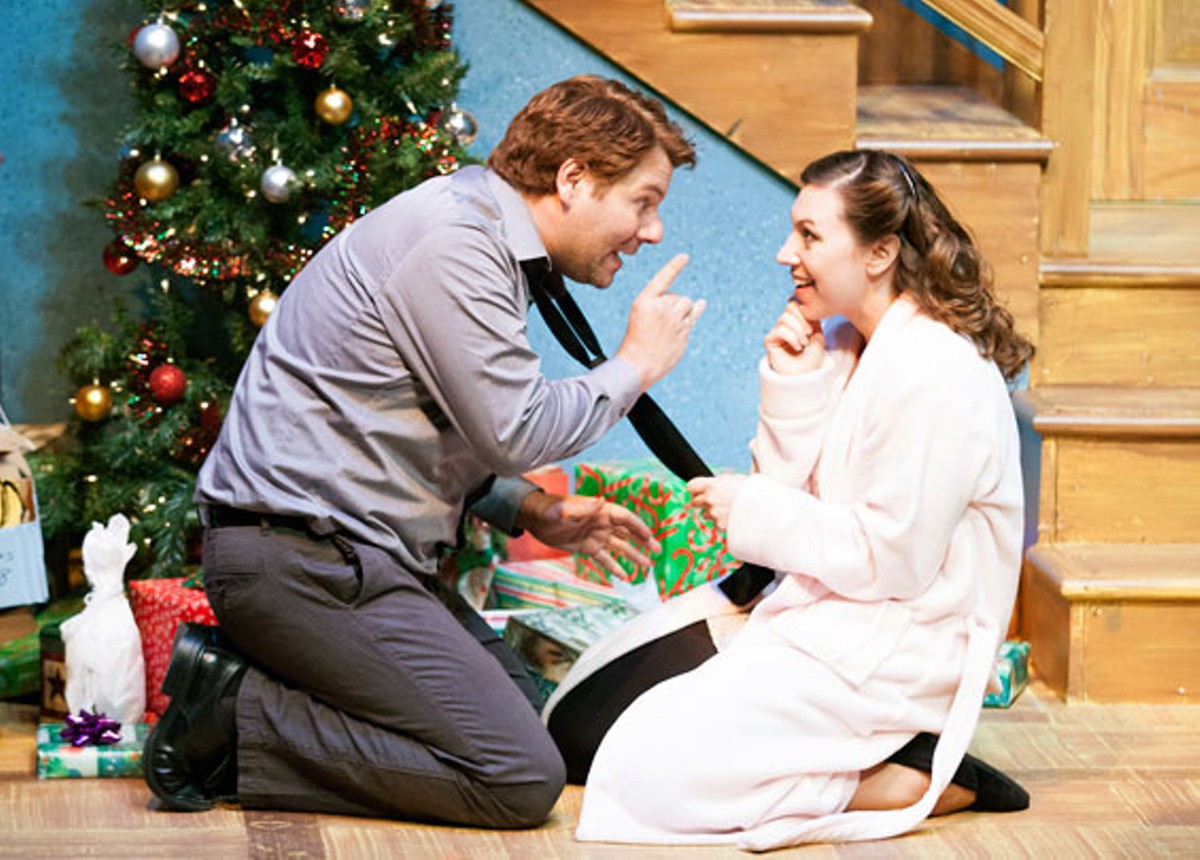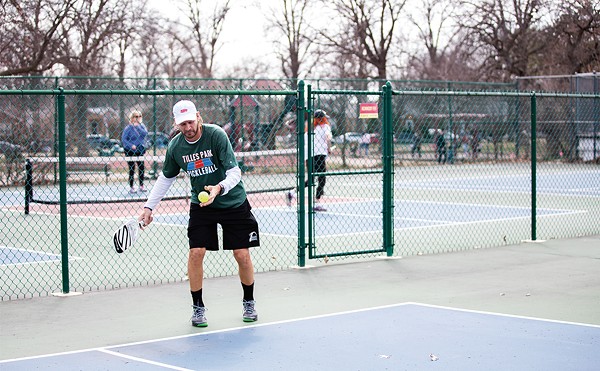To everything there is a season, the Old Testament's Book of Ecclesiastes tells us, including "a time to weep, and a time to laugh." December is the time to laugh. Local productions of two comedies, written within a year of each other in the early 1980s — one still wildly popular; the other obscure to American audiences — are providing pleasure in abundance.
In Larry Shue's goofy The Foreigner, the current holiday offering from the Repertory Theatre of St. Louis, the laughter begins early on and escalates throughout the evening. Set in springtime in the hill country of rural Georgia, The Foreigner is not conventional Christmas fare. Think of it instead as children's theater for adults.
The plot concerns Charlie Baker, an acutely shy British proofreader for a science-fiction magazine who finds himself temporarily abandoned at a remote American fishing lodge. The very idea of having to talk to strangers terrifies Charlie, who is convinced he's deadly dull. "I've often wondered," he muses aloud, "how does one acquire personality?" In a ploy to be left alone, he pretends to be the sort of foreigner who doesn't speak English. Of course the ruse backfires, and this rather exotic outsider becomes the center of attention. Charlie is even forced to improvise his own pidgin language. (Don't be surprised if, after seeing the production, you begin to feel a subliminal yen for Bosco.)
If you're looking for meaty drama that sticks to your ribs, The Foreigner might not be your bowl of grits. At the same time, there are moments when Shue's gentle jabs at sham, pretense and hypocrisy echo motifs from Mark Twain. Famed director-screenwriter Billy Wilder once said that in order to create an involving movie, the filmmaker must "suck the audience in and make them do the work for you, make them participate." That same premise is at play here. If participating in daffy nonsense embarrasses you (when's the last time you put a drinking glass on your head?), it's perhaps best that you stay away. But those who are willing to indulge in two and a half hours of foolish shenanigans likely will leave The Foreigner feeling younger than when they arrived.
Edward Stern directed The Foreigner at the Rep 25 years ago with this same production team — scenic designer John Ezell, costume designer Dorothy Marshall Englis, lighting designer Peter Sargent — so it's perhaps doubly fitting that the stage is bathed in an aura of cozy familiarity: The set feels quaintly happy; the lighting smiles; the costumes look comfortable.
The sense of conviviality extends to the performances. All seven actors seem to be having fun. The willowy Casey Predovic is especially persuasive as Ellard, an overgrown, backward youth who finds a kindred spirit in the foreigner. Jay Smith, who plays the bullying Owen, one of the evening's villains, apparently replaced his spine with a Slinky. Carol Schultz has a field day as Betty Meeks, the naive owner of the lodge. She's especially effective because she (and director Stern) understand that Betty's primary function is to serve as Charlie's audience. Many of our feelings for him are channeled through her.
First among equals, however, is John Scherer in the title role. As the agonizingly shy Brit who morphs into the life of the party, Scherer is a comic marvel, a model of discipline and restraint. He personifies the maxim that "less is more." It's hard to take your eyes off of him, in anticipation of his next unpredictable action. Scherer has total command of the stage. It is always a delight to see a performer who employs such finesse in a performance. Early in Act One, even before Betty goes off in search of her harmonica (what play set in Georgia wouldn't benefit from some spirited harmonica music?), she gazes at Charlie in sublime wonder and says, "See how his face lights up?" Indeed it does — but his isn't the only bright countenance. As The Foreigner casts its spell, look around the auditorium. You're sure to see a sea of bright smiling faces.
Alan Ayckbourn's Season's Greetings, which is being staged by St. Louis Actors' Studio, plays out in the relative-infested home of Neville and Belinda Bunker during Christmas week in England. The evening's longest-running visual joke involves a red holiday cushion on a living-room bench upon which is stitched the word PEACE. Any semblance of peace is impossible in the Bunker home, making the pun on the family surname impossible to miss.
Holiday chaos turns out to be the norm at the Bunker homestead. The Bunkers' daughter Pattie (Wendy Renee Greenwood) is pregnant again; Eddie, her unbearable husband (Tom Lehmann), is a shiftless lout. Gun-toting Uncle Harvey (Jason Grubbe) would rather watch a violent movie on TV than come to the dinner table. When someone observes that there is no dialogue in said action-thriller, the incensed Harvey replies, "They can't talk when they're fighting, can they?" Maybe onscreen they can't, but the Bunker family can. And much of what they say and do is very amusing indeed. The one notable addition to this year's gathering of the clan comes courtesy of Belinda's mousy sister Rachel (Rachel Hanks), who has invited a promising young author (Stephen Peirick) to spend the holidays. In Ayckbourn-land, such a disruption of the status quo can only lead to trouble.
Belinda and Neville have problems of their own — although Neville (Eric Dean White) is usually too busy tinkering with his tools to notice. The much put-upon Belinda might be the play's best-developed character. As portrayed with tart poignancy by Emily Baker, Belinda knows that life is passing her by and she doesn't know how to catch up. She surely doesn't want to end up like her big brother Bernard (Phillip Bozich), an abject failure who's only happy when indulging in the imaginary world of puppetry. (Season's Greetings includes the mother of all puppet shows.)
Bernard's blowsy wife Phyllis (Teresa Doggett) can be dangerous when drunk. Doggett and Bozich are both quite brilliant in this Christmas variation of Edward Albee's George and Martha. Doggett can slur her vowels with the best of them; Bozich's diction is painstakingly precise. He can spit out the word "ne-ga-tive" with the directness of a laser beam.
Season's Greetings is not the same kind of comedy as The Foreigner. Shue's play is infused with bonhomie. The Foreigner believes all's right with the world, even one that's infiltrated by sleazy ministers and bullies. Season's Greetings is more cynical than that. Though its laughs may be more fitful, the unhappy relationships ring truer.
One could nitpick at the production. Why, for instance, does director Elizabeth Helman allow the plaintive Rachel to be so loud throughout Act One? And a nine-character play strains the limitations of the narrow Actors' Studio playing space. On the other hand, it is always a treat to see an Ayckbourn play. Over the decades he has enjoyed the occasional Broadway success with Absurd Person Singular, Bedroom Farce and The Norman Conquests. But it's puzzling that a playwright who has written more than 70 full-length plays and is a treasured institution in England remains an acquired taste in America. To be introduced to Season's Greetings, a heretofore-unseen Ayckbourn comedy, is this year's earliest Christmas gift.






